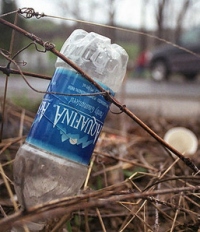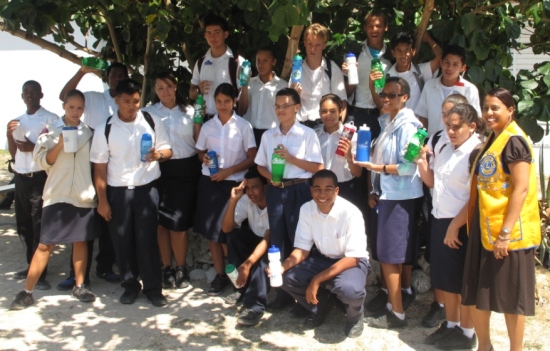Lions challenge students to boycott water bottles
 (CNS): An estimated 20,000 eight ounce plastic water bottles are bought every week on Cayman Brac, high school students were toldin a presentation by the Lions Club of Cayman Brac that highlighted the environmental hazard produced by the use of these single use bottles. The club says it has always emphasized the importance of protecting the environment, undertaking projects geared at educating the community about environmental hazards and encouraging environmentally friendly habits. This year, the club decided to deviate from the usual beach clean-up and instead, made environmental awareness presentations at all of the schools on the island.
(CNS): An estimated 20,000 eight ounce plastic water bottles are bought every week on Cayman Brac, high school students were toldin a presentation by the Lions Club of Cayman Brac that highlighted the environmental hazard produced by the use of these single use bottles. The club says it has always emphasized the importance of protecting the environment, undertaking projects geared at educating the community about environmental hazards and encouraging environmentally friendly habits. This year, the club decided to deviate from the usual beach clean-up and instead, made environmental awareness presentations at all of the schools on the island.
At the infants and primary level the students were shown videos and a PowerPoint presentation which encouraged them to ‘Reduce, Reuse & Recycle’, the club said in a release. The presentation and discussions which followed also emphasized the importance of everyone playing a part in protecting the environment.
The presentation at the Layman E. Scott Senior High school (formerly Cayman Brac High), also emphasized the importance of everyone taking steps to reduce the negative impact of pollution on the environment. However, at the high school level there was a focus on the negative impact of single use water bottles on the environment.
Through the presentations made by the Lions, students and teachers were told that water bottles create a lot of trash. According to a small scale research undertaken by the club, approximately 20,000 eight ounce bottles are bought every week on Cayman Brac. “There are no provisions for recycling these bottles so they just pile up at the dump”, stated environmental chair, Lion Fazileta Yusuf.
Students also heard that the plastic from the bottles do not biodegrade but photo degrade into tiny particles that stays in the environment for thousands of years, seeping into the soil, ponds and the ocean and may be ingested by marine life. They also learned that bottled water is no safer than tap water in most countries. and that plastic bottles pose a health risk. The chemicals from the plastic seep into the water over a period of time and heat speeds up the rate at which these chemicals seep into the water.
The students and staff at the high school were encouraged to reduce or refuse the use of these water bottles and carry reusable water bottles instead.
The presentation was followed up less than a week later with a challenge to the high school population; they were challenged to boycott bottled water for one day, 19 April. On that day the students and staff were asked to bring their reusable water bottles to school and were provided with chilled filtered water. Approximately 50 reusable water bottles were also distributed.
"The challenge was well received and a large percentage of the students and almost all of the staff refrained from buying bottled water during the day and used the water provided," Yusuf said. "This also sparked an interest in many individuals thinking of reducing the use of the single water bottles as a life-style change”.
“The aim of the project was to send the message that we all need to recognize the profound impact that our activities have on the environment,” Ysuf continued. "As citizens of the world, it is our responsibility to protect the environment that we live in and that each of us no matter how small we may think it is, could play an important role in this protection”.
The club would like to express thanks to the Cayman Islands Diabetes Association-Sister Islands Chapter, Cayman National Bank and the National Trust-Cayman Brac for donating reusable water bottles. They are also grateful to Joe Musuneci for donating 40 gallons of filtered water from Filter Fountain. The Lions Club of Cayman Brac continues to fulfill the mission of Lions International in serving the community of Cayman Brac. For more information about the club’s service activities, visit their blog at www.braclions.blogspot.com or email them at cblions@candw.ky.
See The Story of Bottled Water Video presented at the High school.

Category: Science and Nature


Nope. Wrong. Not 20,000, not 2,000, not even 200 or 20 or 2 eight-ounce bottles of bottled water are bought every week on Cayman Brac. Try again and get it right next time.
Whatever the correct data, other than those who do not have a cistern (a rare case these days) or those few times when you are out and about and parched for water and you stop at the nearest shop for a bottle, there is no justification for buying packaged water. I save my plastic water bottles and refill them. I have one of those filter pitcher gizmos and when Water Authority water is run through the pitcher's charcoal filter it is comparable to bottled water in taste, wayyyyy cheaper and probably purer. Some very popular brands of bottled waters are just processed municipal "tap" water; you are paying big money for the name and a bottle and something you could do at home.
For those of you who are under the delusion that bottled water is some how more pure than tap water, think again: testing conducted under the auspices of the Environmental Working Group (EWG), revealed that many popular brands of bottled water have high levels of trihalomethanes and many other toxins and impurities. Results from leading American water quality laboratories found that 10 popular brands of bottled water contained an aggregate total of 38 chemical pollutants, with an average of 8 such pollutants in each brand.
A host of dissolved pollutants and toxins are not removed by simple filtering. An article published in October of 2008 by the EWG stated that: "analyses conducted … (on) 10 brands of bottled water revealed a wide range of pollutants, including not only disinfection byproducts, but also common urban wastewater pollutants like caffeine and pharmaceuticals; heavy metals and minerals including arsenic and radioactive isotopes; fertilizer residue (nitrate and ammonia); and a broad range of other, tentatively identified industrial chemicals used as solvents, plasticizers, viscosity decreasing agents, and propellants." Other stuff found in bottled water included: "a cocktail of chlorine disinfection byproducts….even fluoride".
Many of the toxins found in tested samples of bottled water are known to cause cancer.
The samples of water with the most impure profiles can be found in bottled water from a "natural" source. Some of the most dire chemical test results are related to bottled water that is the result of processing "mountain steam" or "spring" water which can actually contain significantly more undesirable chemicals due to leaching and runoff from ground water entering the stream or the aquifer that feedsthe source spring.
What is alarming is that most municipalities and the Environmental Protection Agency (EPA) in the USA have stringent requirements for regular testing and reporting of the contents of municipal tap water but the bottled water industry is not held to the same strict standards. There is a push by consumer groups urging the EPA to make bottled water producers adhere to the same standard as tap water. The bottled water industry is strongly resisting such a move. In my opinion the reason is that they do not want consumers to know that the image of bottled water as being more pure than tap water is a sham and not worth upwards of 1,000 times the cost.
In spite of the pictures of pristine mountains and springs, and pure-sounding names, Aquafina is bottled at Pepsi plants using processed municipal water, as is Coke’s Dasani brand.
The origin of mains-supplied tap water here is from a desalination process using sea water. It is superior product to most city water in the USA and has far less potential to contain harmful toxins; thus, in the Cayman Islands, just running your tap water through a charcoal filter is a generally safer option than buying imported bottled water.
Where bottled water wins over unfiltered tap water is in the flavour department. And most people think if it tastes "pure" it is pure. Wrong! As tap water runs through the mains piping and house piping it acquires a more or less "heavy" taste. By simply running a good-quality tap water through a filtering pitcher (the one made by Brita for example) the charcoal filter "scrubs" out most acquired favours and the result is "fresh" tasting water, to me superior to the "plastic bottle" taste of most bottled waters – at a tiny fraction of the cost of bottled water.
An even better and more pure result can be achieved by running tap water through an under counter tap-pressure reverse osmosis and filtering unit. While they use a lot more input water per gallon of purified water, compared to buying bottled water, these units are still a very cost-effective way to get excellent drinking water at home. For a fraction of the cost of bottled water one can have drinking water that is far superior to and vastly purer than most bottled waters. Cost: between $200 and $600 per unit.
Bottom line: The purity of imported bottled water cannot be trusted. In my opinion and especially in difficult economic times, it must be either severe dehydration or people are morons for them to pay big dollars for what the mains-supplied water producers here in the Cayman Islands charge fractions of a penny for. Hint: Get smart; buy a filter pitcher and use plain old tap water.
The Lions Club is to be commended for this presentation. I have always held that the education that isn't provided at home should be taught in the shools……, which includes preservation of our land and sea. How many of you have walked the beaches and seen the incredible amount of plastic bottles there! I do not throw my plastic (or glass) bottles about on our landscape. Do you???